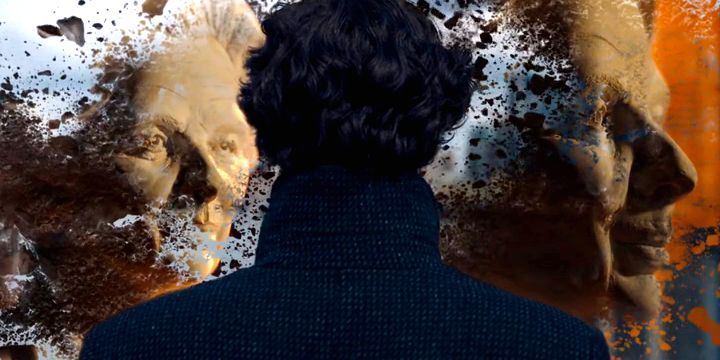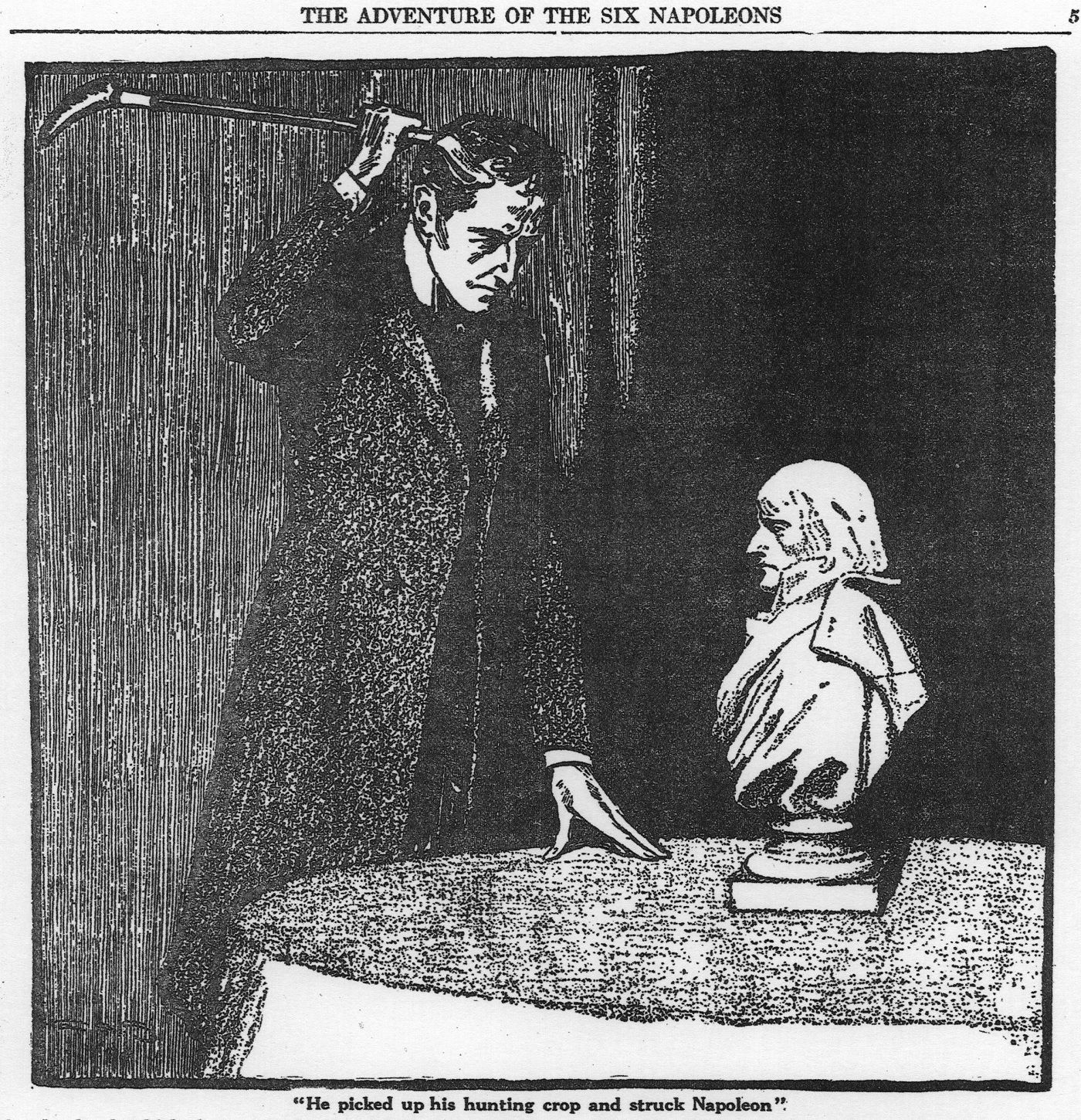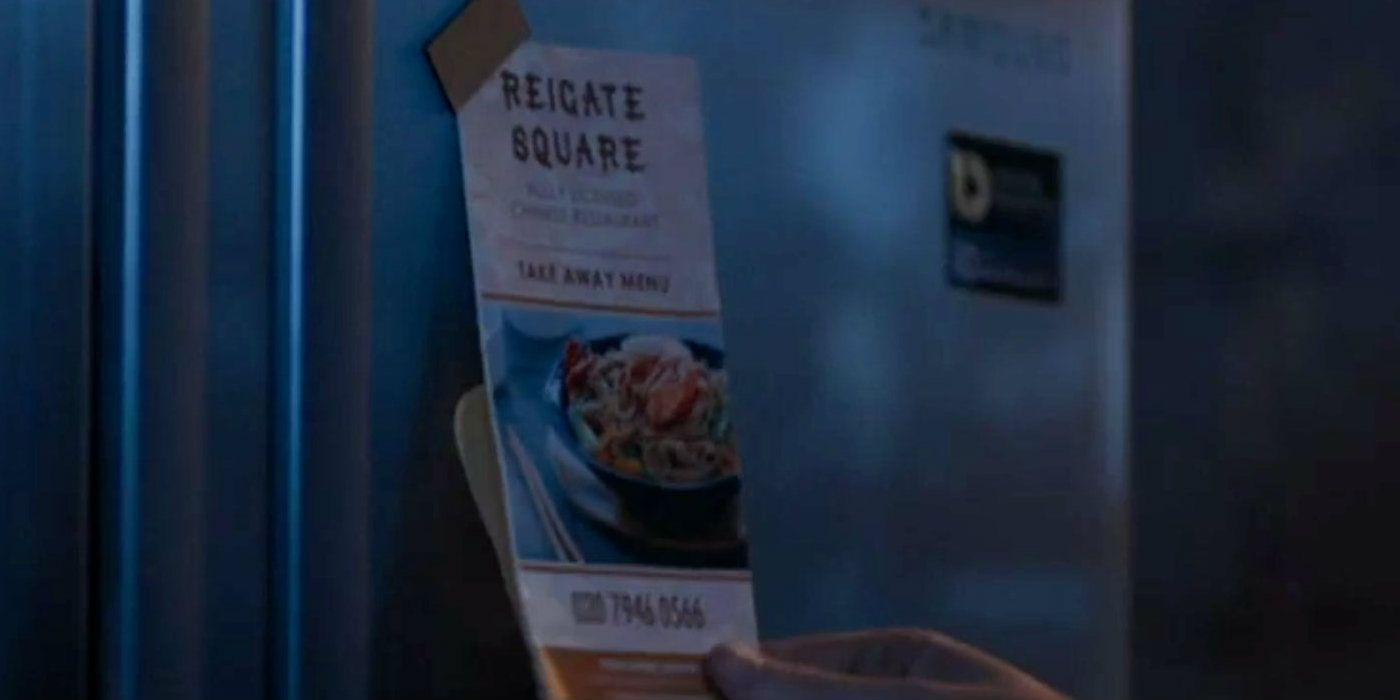Warning: MAJOR SPOILERS ahead for Sherlock: The Six Thatchers
-
Sherlock has returned to our screens, ushering in the New Year with the mystery of a burglar who steals nothing, but instead has been destroying identical busts of Margaret Thatcher. Showrunners Steven Moffat and Mark Gatiss are, naturally, huge fans of Sir Arthur Conan Doyle’s original Sherlock Holmes stories, and the first episode of season 4, "The Six Thatchers," is peppered with references to the source material..
Firstly, the title and basic plot for the episode were both lifted from Doyle’s work, "The Adventure of The Six Napoleons" - a short Sherlock Holmes story that was published in The Strand magazine in 1904. In "The Six Napoleons," Lestrade contacts Sherlock with details of a case which involves three break-ins, where nothing has been stolen or damaged save for a plaster bust of Napoleon in each case. Each time, the bust has been smashed to pieces in a spot where the light was good, leading Sherlock to suspect that the bust smashing isn’t an act of hatred toward the late French General, but rather a case of someone looking for something.
His theories are confounded when a fourth bust is taken, and this time the thief murders an eye-witness to the case, before escaping and smashing the bust under a streetlight further down the road. Sherlock and Watson trace the seller of the busts, and he provides them with the names of the other two owners. The pair (along with Lestrade) then capture the thief at the house of one owner, and Sherlock pays the owner of the sixth and final bust a very handsome amount for him to hand the bust over intact. As soon as the owner has done so, Sherlock smashes the bust and discovers hidden inside... the Black Pearl of Borgias!
In "The Six Thatchers," it’s busts of the late Margaret Thatcher that are being smashed - this time by an assassin who used to work with Mary Watson, who is searching for a memory stick that contains all their aliases and information on their work. Sherlock does reference the Black Pearl (a case he deems too boring to investigate directly), assuming that this is what the villain is searching for, and that they are working for Moriarty. He is wrong, of course… though given the show's love of plot twists there is still a chance that AJ could have been carrying out part of a plan cooked up by Moriarty. Sherlock is convinced Moriarty is dead, but we all know people have a habit of faking such things in this show.
In Moffat and Gatiss’ take on "The Six Napoleons," then, the Black Pearl is nothing more than a reference point, but there are still many Easter Eggs to watch out for - from the small and insignificant, to the rather ominous. A big reference to the original story, but one that doesn’t really mean so much, came in the closing credits, when seemingly random letters were highlighted in red. Watch frame by frame, and it will become apparent that the letters spell out "Six Napoleons." A reference was also made to the original work when Thatcher was compared to Napoleon.
One of the lighter moments in this first episode came when viewers saw a shot of Sherlock seemingly berating John Watson. “You see,” he says exasperatedly, “but you do not observe. To you the world remains an impenetrable mystery whereas to me it is an open book. Hard logic versus romantic whimsy, that is your choice. You fail to connect actions to their consequences. Now, for the last time, if you want to keep the rattle, you do not throw the rattle.” Sherlock is, of course, addressing Rosie Watson, but the whole speech (except the line about the rattle) is lifted from another of Doyle’s stories, "A Scandal in Bohemia."
The unmovable dog (who really was unmovable according to Moffat), named Toby, was also an instantly recognizable Easter Egg to any Holmes fan. The hound often accompanies Sherlock on several cases, but he doesn’t live with him. He doesn’t live with Craig the hacker, either, but with a man named Mr. Sherman. Either way, Toby on screen proved himself to be infinitely less helpful than Toby on paper. One other little Sherlock Holmes tidbit; when Mycroft takes the takeout menu from his fridge, the name of the restaurant is Reigate Square, highly similar to the name of another Sherlock short story, "Reigate Squire."
There is a reference too, to "The Adventure of the Redheaded League" - when Sherlock explains his deductions to a client, he responds with “I thought you’d done something clever, but it’s simple, isn’t it?" The same line is used by a client in that story.
It’s the more important references that really add to the plot of "The Six Thatchers" - starting with Norbury. That’s the surname of Vivian, the quiet and unassuming (or so we thought) secretary who ends up shooting Mary dead; but in Doyle's "The Adventure of the Yellow Face," it’s the name of a borough in South-West London. Sherlock, ever renowned for being quite full of himself, misses an important clue hidden in a cottage there, meaning he cannot solve the case. Afterwards, he says to John "If it should ever strike you that I am getting a little overconfident in my powers, or giving less pains to a case than it deserves, kindly whisper 'Norbury' in my ear, and I shall be infinitely obliged to you."
In "The Six Thatchers," upon returning home after the death of Mary, reeling with shock and guilt, Sherlock says to Mrs. Hudson: “If you ever think I’m becoming a bit full of myself, cocky or overconfident, just say the word ‘Norbury’ to me, would you? Just that. I’d be very grateful.”
Mary’s death is Sherlock Holmes canon, though Moffat and Gatiss rightly gave her departure much more weight than just the passing remark John gives in the stories. Her posthumous video asks Sherlock to “Save John Watson,” - a phrase that Mary and Sherlock encountered together in "The Empty Hearse." Chances are, those words hold some sort of alternate meaning, just as the “Go to hell, Sherlock,” that came post credits from Mary surely does too. In that case, "hell" could well refer to a specific place where Sherlock will find out more. It may even relate to the mysterious ‘E’ that John seems to be having some sort of illicit affair with. Is Moriarty using the woman to get close to John?
While "The Six Thatchers" might not have been the strongest episode of Sherlock ever, it is these nods - the subtle and the obvious - that makes the show so utterly watchable, and keeps viewers coming back from more. The references to canon, the red herrings, and the small hints at what’s to come all add up to a show that gives viewers plenty to unravel in the days following each episode. We are all sleuths in this game - though none of us are quite as good at guessing the outcome as Mr. Holmes himself.
Next: What Lies Ahead For Sherlock and John in Season 4?
Sherlock season 4 continues with 'The Lying Detective' on January 8th on BBC 1 and Masterpiece



